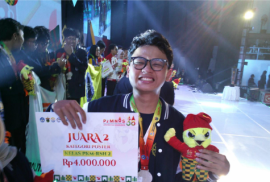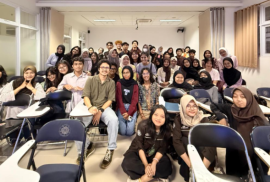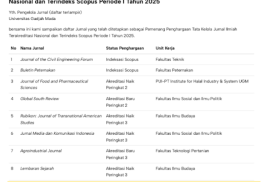On the 27th of November (the awarding night of the 38th Pekan Ilmiah Mahasiswa Nasional (Pimnas) held in Universitas Hassanudin, Makassar), a bachelor student of Cultural Anthropology from UGM contributed to the medal count of Universitas Gadjah Mada. Muhammad Syukur Shidiq – commonly known as Syukur – and his team earned a silver medal for the poster category of the PKM-RSH 2 class. Their research, titled Antara Safe Space dan Toxic Space: Studi Ekologi Media terhadap Komunitas Marah-Marah di Media Sosial X, applies the concept of media ecology coined by Marshall McLuhan to study the Komunitas Marah-Marah, a community established on X (formerly Twitter).
Komunitas Marah-Marah is viewed as a communal space with two sides, both contradicting each other. This community provides room for freedom of emotional expression (specifically anger, as the name suggests) for its members while giving them affirmation from fellow members. At the same time, negative actions such as cyberbullying, hate speech, and discrimination are also rampant in the space. What started out as a small community has tripled in size in the span of a year. The results of this research can hopefully be used as a contribution to increase digital literacy among the Indonesian digital community, along with creating a safe online space for users and as consideration for policy makers to create better online policies.
As an anthropology student, there are a few lessons Syukur picked up during his Pimnas research. The discipline of anthropology plays a role in understanding Komunitas Marah-Marah as a living digital environment, filled with members with various cultures and perspectives. X as a social media is viewed as an ecology that shapes and influences how people express their emotions. The existence of this community helps shape the understanding of how anger grows and evolves into its own culture in a digital context.
During four months of Pimnas research, Syukur learned some valuable lessons for himself, as a person and as a researcher. Along with getting the opportunity to experience field research first-hand, Syukur learned to collect, sort, and process ethnographic data while working in a systematic workflow. This opportunity gives him the chance to train his cultural intuition and reflectivity as an anthropologist. He also learned to be committed to a research project and working in a multidisciplinary approach. His team members consisted of fellow bachelor students Muh Faiq Fauzan, Fanisa Ratna Dewi, Debora Magdalena Marchya Sihombing, Muhammad Syukur Shidiq, and Adelia Pradipta Nasyaputri. They hail from various departments of social sciences, such as Communication Science, Social Development and Welfare, Philosophy, and Psychology; each with their own methods and perspectives, collaborating towards the same goal to reach a better understanding of a dynamic socio-digital environment.
Author: Amadeus Abhirama Paramanindita







